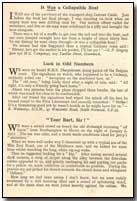Memoirs & Diaries - The Best 500 Cockney War Stories - It WAS a Collapsible Boat and Other Stories
 Published in London
in 1921, The Best 500 Cockney War Stories
comprised, in the words of its newspaper publisher (The London Evening
News) "a remembering and retelling of those war days when laughter
sometimes saved men's reason".
Published in London
in 1921, The Best 500 Cockney War Stories
comprised, in the words of its newspaper publisher (The London Evening
News) "a remembering and retelling of those war days when laughter
sometimes saved men's reason".
The collection of short memoirs, some 500 in total, is divided into five categories - Action, Lull, Hospital, High Seas and Here and There. This page contains five stories from High Seas, led by It WAS a Collapsible Boat.
Other sections within the collection can be accessed using the sidebar to the right.
It WAS a Collapsible Boat
I was one of the survivors of the transport ship Leasowe Castle. Just before she took her final plunge, I was standing on deck when an empty boat was seen drifting near by.
Our section officer called for swimmers, and five or six men went overboard in a jiffy and brought the boat alongside.
There was a bit of a scuffle to get over the rail and into the boat, and one man jumped straight into her from a height of about thirty feet. To our dismay he went clean through - it was a collapsible boat!
No sooner had this happened than a typical Cockney voice said: "Blimey, he's got the anchor in his pocket, I'll bet yer"
-G. P. Gregory (late 272 M.G. Company), 107 Tunkar Street, Greenwich
Luck in Odd Numbers
We were on board H.M.S. Sharpshooter, doing patrol off the Belgian coast. The signalman on watch, who happened to be a Cockney, suddenly yelled out: "Aeroplane on the starboard bow, sir."
The "old man," being fairly tired after a night of rain, said: "All right, it's only a friendly going back home."
About two minutes later the plane dropped three bombs, the last of which was much too close to be comfortable.
After our friend the signalman had wiped the splash off his face he turned round to the First Lieutenant and casually remarked: "Strike! It's a thundering good job he wasn't hostile or he might have hit us."
R. Walmsley, D.S.M., 47 Watcombe Road, South Norwood, S.E.25
"Your Barf, Sir!"
We were a mixed crowd on board the old Archangel returning "off leave" from Southampton to Havre on the night of January 6, 1917. The sea was calm, and a moon made conditions ideal for Jerry's "skimmers."
When we were well under way I chummed up with a typical son of the Mile End Road, one of the Middlesex men, and we talked for some time whilst watching the long, white zig-zag wake.
Then he suggested looking for a "kip." After nosing around several dark corners, a strip of carpet along the alley between the first-class cabins appealed to us, and quietly unslinging kit and putting our packs for a pillow, we made ourselves as comfortable as possible.
During the process my pal jerked his thumb towards the closed doors and whispered "Orficers".
How long we had been asleep I don't know, but we were rudely awakened by a dull booming thud and a sound of splintering wood, and at the same time we were jolted heavily against the cabins.
We hurriedly scrambled to our feet, looked at each other (no need' to ask what had happened!), then grabbed our kit and made for the deck.
As my companion passed the last cabin he banged on the door with his fist and called out: "Oi, yer barf'll be ready in a minute, sir!"
A. E. Ulyett, 41 Smith Terrace, King's Road, Chelsea, S.W.3
"Mind My Coat"
Middle watch, H.M.S. Bulldog on patrol off the Dardanelles: a dirty and a black night. A shout of "Man overboard!" from the fore-gun crew...
We located an A.B. in the water, and with a long boat-hook caught his coat and pulled him towards the boat. As he drew nearer he cried: "Don't pull so bloomin' hard; you'll tear my blinkin' coat!"
Then we knew it was our "Ginger," from Poplar.
Now "Ginger" has the life-saving medal. A few weeks after his ducking the ship struck a mine and the after-part went west: "Ginger" was discovered in the water, having gone in after a wounded sub-lieutenant who had been blown overboard.
Henry J. Wood, D.S.M., 19 Gracechurch Street, E.C.3
"Wot's the Game - Musical Chairs?"
It was a bitterly cold day in December, somewhere in the North Sea. A section of mine-sweepers were engaged clearing an area well sown by Jerry's submarines. Suddenly the expected happened, and in a few minutes one of the sweepers was settling down fast by the stern.
Those who did not "go west" in the explosion were with difficulty picked up; among them was a Cockney stoker rating.
He arrived on board, wet, cold, and pretty well "pumped," and the bo'sun's peg of rum had almost disappeared between his chattering teeth when there was another explosion, and once again he was in a sinking ship.
His reply to the order "abandon ship," which he had heard for the second time within half an hour, was : "Wot blinkin' game's this - musical chairs?"
H. Waterworth, 32 Grasmere Road, Muswell Hill, N.10 (late Engineer-Lieutenant, R.N.R. (retired))
Next - A Voice in the dark and four other stories
A "dope can" was a metal syringe containing petrol for priming an aircraft engine.
- Did you know?
